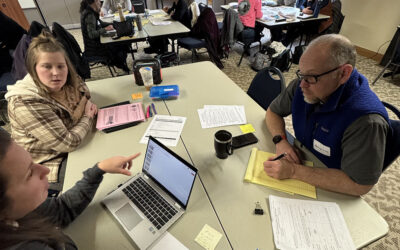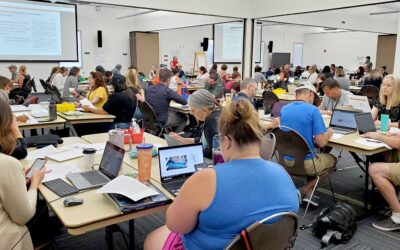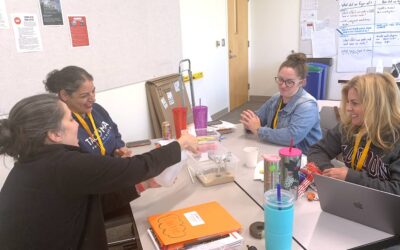ESD 189
Northwest ESD is approaching equity in access to climate science learning through the spheres of P-K learning, indigenous ways of knowing science and pedagogical tools that engage all learners.
The NWESD has created multiple entry points for teachers and administrators to the body of work that will now constitute WA STATE ClimeTime. At the elementary level, pre-K and K teachers have created sharable lessons. The NWESD SMC has piloted (and chose) materials for adoption by their member districts.
NWESD has also collaborated with CBOs and other ESDs to create materials and processes that can be used as part of professional learning.
Materials Support Projects
OpenSciEd Elementary Field Test
Northwest ESD is supporting our state’s Elementary School OpenSciEd field test teachers by procuring them the materials they need for transformative professional development and for classroom instruction with their students. These field test teachers are on the cutting edge of science instruction and pedagogy and will be testing and informing the remainder of the Elementary OpenSciEd through 2025.
HS OpenScied PLC
Northwest Educational Service District is supporting a PLC of High School OpenSciEd field test teachers who will come together four times in the 2023-24 school year to review released units, inform the broader cohort of field test teachers about changes, inform future professional learning needs in our region and in the state, and identify or create a practical measure to help teachers see the affective changes in their students stances toward science or their self-perception as scientists.
Pedagogical Projects
Teacher Workshops with Community Based Organizations
In 2023-24, Pacific Education Institute, Islandwood, Padilla Bay, and Teaching for the Climate Collaborative are providing climate science education opportunities for teachers in our region. As these opportunities become available, we will be sharing them through our website and through our social media feeds as well as supporting the pedagogical needs of their programs.
Science Discipline and Cultural Content Knowledge Projects
Teaching Climate Change Book Study
Northwest Educational Service District will host a book study around Mark Windschittl’s “Teaching Climate Change: Fostering Understanding, Resilience, and a Commitment to Justice”
NGSS and Middle School Math
The Northwest Educational Service District Regional Math Coordinator Science Coordinators will create a workshop or online class meant to help middle school mathematics teachers and science teachers make sense of the Common Core Statistics and Probability Domain Progression Document in order to better understand how to help students in grades 6-8 engage in sense-making through the science and engineering practices of Analyzing and Interpreting Data; and Using Mathematical Thinking.

Upcoming Classes
Partners & Collaborators
UW School of Oceanography
WA Green Schools
Classes
Indigenous Ways of Knowing Climate Science in the NWESD Region
The STEM teaching tools from the UW Institute for Science and Math Education are providing the foundation for our work with tribal elders in the NWESD region. In designing this place-based instruction for teachers, we acknowledge the dual citizenship of our tribal students and tie tribal students’ understanding of climate science to their tribal origins. A big part of this for our non-tribal teachers is learning to get our students outside into their environments. Curriculum for this teacher workshop is currently being developed, pending deployment in spring of 2019.
Field Experience in Climate Science
Our community-based partners’ field experiences are being scheduled. Teachers will have access to substitutes for their own “learning outdoors” which will primarily happen in Spring 2019.
All I Need to Know to Understand Climate Science I Learned in High School Chemistry
University of Washington College of Oceanography professors and graduate students will provide learning experiences aligned to introductory oceanography courses and current research practices. Participants will learn current climate science taught at UW and build a spectrophotometric device, modeled after those used in current ocean research, to measure pH. Each participant will take home a device that could possibly be built by students in their science classroom.
OpenSciEd Piloting
Eight excited teachers are piloting their first unit of the OpenSciEd Grades 6-8 Open Educational Resources (OER) materials developed with support from the Carnegie Institute. Data is being collected not only on teacher experiences but also around student experiences using these materials.
Climate Science – FREE Canvas Course
In this course, designed in collaboration with ESD113, attendees will learn a protocol for conducting student-centered, whole-class discourse. Structured as three one-month cohorts and divided into grade bands, the protocol, along with the skills and knowledge learned will be transferrable to other content areas beyond science. In this context of the course, participants will apply the protocol to a climate science topic. With regard to NGSS alignment, the course focuses on the practice of “engaging in argument from evidence.” Registration and information through ESD 113.
Collaboration for Ambitious Science Teaching and Learning (CASTL)
Following their Summer Institute, two new cadres of 56 teachers are using 3-D instruction around climate science phenomenon in their classrooms. These teachers came back together in fall 2018 to review their students’ work and reflect on their students’ learning. As the work progresses, teachers will continue to monitor student progress and come back together with their colleagues to adjust their units.
Stories of Us and the World: How We See Ourselves in Relation to Our Environment
English Language Arts are a vital backbone of learning science. To solve the problems of tomorrow, all students must understand their relationship to our climate and see themselves as active, empowered citizens of our world. In this two-day workshop, we will investigate how first-hand knowledge and experiences with climatic events put migrant students in a position to lead in learning about climate science. Participants will learn strategies that support practices for inclusion, empowerment, and participation in climate science and literacy learning. On the second day of the workshop, participants will come back to share student artifacts and to learn from each other’s experiences. This event is scheduled for January 29 and February 25, 2019. Event ID: #84642
Piloting K and 3rd Grade Amplify Kits
In early October, 52 elementary teachers across nine school districts in the NWESD Science Materials Cooperative received instruction on the use of Amplify Science Kits. Twelve of these teachers are piloting climate science based units. Data is being collected not only on teacher experience but also around student experience using these materials.
Climate Science for Pre-K and K
A design team of Pre-K and K teachers met for professional learning around NGSS, 3-D learning, and science phenomenon. As part of this grant opportunity, these teachers received science materials and, at the end of January 2019, each participating teacher came back to the group to share samples of student work and units of instruction. From these units and ideas, a professional development day is being designed that will take place on April 22, 2019. Registration can be found here.
Success Stories from NWESD
Post Pandemic, CASTL Rises!
CASTL, the Collaboration for Ambitious Science Teaching and Learning, was launched in 2018 as a regional extension of Washington’s NSF-funded Math and Science Partnership, PASTL. The initiative focuses on engaging teachers in Ambitious Science Teaching (AST) to assess...
OpenSciEd High School Summer Institute inspires and motivates teachers
“We need to stop thinking, ‘Is this student good enough for my science class?’ and start asking, ‘Is my science class good enough to engage all students?’” This was the question posed by Jamie Yoos, a chemistry teacher and OpenSciEd facilitator from Bellingham,...
OpenSciEd Elementary Field Test Launch Summer 2023
The OpenSciEd Elementary Field Test launched this August on the beautiful Washington State University, Vancouver campus. Over seventy elementary teachers from across the state participated in this three-day project launch learning about the high-quality OpenSciEd...




